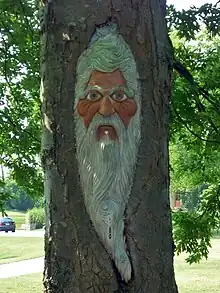William Lee Golden | |
|---|---|
 Golden in 2013 | |
| Background information | |
| Birth name | William Lee Golden |
| Born | January 12, 1939 |
| Origin | Brewton, Alabama, U.S. |
| Genres | Country, gospel |
| Occupation(s) | Singer, painter |
| Instrument(s) | Vocals (baritone) |
| Years active | 1965–present |
| Labels | MCA, Mercury |
| Member of | The Oak Ridge Boys |
| Website | www |
William Lee Golden (born January 12, 1939)[1] is an American country music singer. Between 1965 and 1987, and again since December 1995, he has been the baritone singer in the country vocal group The Oak Ridge Boys.
Golden was inducted into the Country Music Hall of Fame in 2015 as a member of the Oak Ridge Boys.
Career
Golden joined The Oak Ridge Boys (then a Southern gospel music group) in 1965. Golden is widely known for his waist-length beard and hair, and has become one of the most recognizable faces in the entertainment industry. Golden was voted out of The Oak Ridge Boys in 1987, as the other three members wanted to change the band's image.[2] He was replaced by Steve Sanders, but stayed with MCA Records as a solo artist to record an album titled American Vagabond, which included two chart singles.[3] In 1990, he moved to Mercury Records and released "Louisiana Red Dirt Highway".[2]
Sanders left the group in 1995 and Golden returned on New Year's Eve of the same year.[4]
Personal life
Has been married four times.[5] Golden was married to Frogene Normand from 1957 to 1975. He married Luetta Callaway in 1984 and they divorced in 1987. He was married to Brenda Kaye Hall from 1990 to 2013. Golden married Simone De Staley in 2015. They live in Hendersonville, Tennessee. He has four sons, Rusty, Craig, Chris and Solomon, a step-daughter and seven grandchildren. Golden's sons Rusty and Chris recorded as The Goldens for Epic Records and Capitol Records between 1988 and 1991.[3] They also played in his road band during his solo career.[2]
The "Golden Era Plantation"

Golden's home is called The "Golden Era Plantation." Built in 1786, it is recognized as the oldest brick home in Sumner County, Tennessee. The Federal-style structure was built in 1786, then called "Pilot's Knob," on a military outpost by American Revolutionary War Captain James Franklin, the father of planter and slave trader Isaac Franklin (1789–1846). After the war, he was awarded a land grant to the property.
During the Civil War, the Plantation became a station camp for Confederate soldiers. In order to protect their valuable gold and silver from approaching Union soldiers, the occupants buried the metals in the ground surrounding the house. This gold was later discovered during renovation of the home in 1976.
The area has been struck twice by tornadoes; once in 1892 and again on April 6, 2006. Originally a two-story building, the second story was removed by the first tornado. Repairs were made leaving it as a single-story home. Following the second tornado, the home's architecture was restored, adding a second story. William Lee Golden still resides at Golden Era. [6]
Discography
Albums
| Year | Album | US Country | Label |
|---|---|---|---|
| 1986 | American Vagabond | 53 | MCA |
| 2000 | My Life's Work | — | Audio Visual Arts III |
| 2010 | The Artist[7] | — | self-released |
Singles
| Year | Single | Chart positions | Album | |
|---|---|---|---|---|
| US Country | CAN Country | |||
| 1986 | "Love Is the Only Way Out" | 53 | 58 | American Vagabond |
| "You Can't Take It with You" | 72 | 52 | ||
| 1990 | "Keep Lookin' Up"[8] | — | — | — |
| "Louisiana Red Dirt Highway"[9] | — | — | ||
Guest singles
| Year | Single | Artist | US Country | Album |
|---|---|---|---|---|
| 1990 | "Tomorrow's World" | Various artists | 74 | Single only |
Music videos
| Year | Single |
|---|---|
| 1990 | "Keep Lookin' Up" |
| "Louisiana Red Dirt Highway" |
References
- ↑ McCall, Michael; Rumble, John; Kingsbury, Paul (December 16, 2004). The Encyclopedia of Country Music. Oxford University Press. ISBN 978-0-19-984044-1.
- 1 2 3 Peña, Susan L. (August 12, 1994). "When it comes to country music, he's Golden". Reading Eagle. Retrieved September 20, 2011.
- 1 2 Whitburn, Joel (2008). Hot Country Songs 1944 to 2008. Record Research, Inc. p. 164. ISBN 978-0-89820-177-2.
- ↑ Whitburn, p. 303
- ↑ McCall, Cheryl (April 25, 1983). "After Months on the Warpath, the Battling Oak Ridge Boys Pass the Peace Pipe". People. 19 (16). Retrieved November 10, 2018.
- ↑ "Passing on the Torch for a Golden Era - YourSumner". yoursumner.com. Archived from the original on March 11, 2016. Retrieved January 13, 2022.
- ↑ "William Lee Golden - The Artist - Amazon.com Music". Amazon.com. May 2, 2018. Retrieved April 18, 2020.
- ↑ "Single Reviews" (PDF). Billboard. March 31, 1990.
- ↑ "Single Reviews" (PDF). Billboard. August 11, 1990.
External links
- Official website
- "Biography." William Lee Golden. 25 October 2007.
- "Golden Era Plantation." William Lee Golden. 25 October 2007.